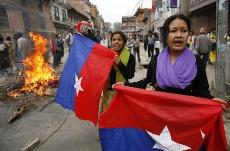On April 3, Nepalese Maoist rebels announced a four-day ceasefire, beginning April 6, in Kathmandu, the capital. On April 6, rebels broke the ceasefire. The ceasefire was aimed to create a safe environment for the anti-monarch rally planned by a seven-party opposition alliance. The seven-party alliance has an informal pact with the rebels to put pressure on King Gyanendra to end his rule.
The rebels, the seven-party alliance, and other groups opposing Nepal’s monarchy have been fighting for ten years to transform Nepal into a communist republic.
Rebel leader Prachanda said that the partial truce was intended to thwart what he said was the government’s conspiracy to crackdown on the protests on the pretext of rebel infiltration.
“We have decided to stop our military offensive in the capital until further notice to expose the claims of the autocratic regime that we were planning to infiltrate the seven-party protest program,” Prachanda said to The Sydney Herald.
The Nepalese government refused to reciprocate the ceasefire, saying that the rebels cannot be trusted. However, not everyone in the government was so distrusting.
“This is a welcomed move,” said Krishna Prasad Sitaula, Nepali Congress spokesperson, to ABC News on April 3. “The positive gesture by the Maoists will help the peaceful movement of the seven-party alliance.”
The royal government warned the public not to participate in the protest.
The government disrupted a protest in January by arresting hundreds of political and human rights activists. To further upset the protest, the government imposed a night curfew, cut mobile phone lines, and banned public gatherings.
The United Nations urged the Nepalese government to avoid such a step during this protest.
“The right to peaceful assembly should be respected, and nobody should be arbitrarily arrested or detained for exercising their rights to a peaceful assembly,” said Ian Martin, High Commissioner for the U.N. Office of Human Rights in Nepal, to the BBC.
“While maintenance of law and order is the responsibility of the state, security considerations should not be the basis for denying citizens their right to peaceful protest,” said Kofi Annan, U.N. Secretary General, to the BBC.
The Nepalese government’s stringent measures did not deter people from supporting the rebels and their demand that the king relinquish his power. The day of the protest, businesses and schools shut down and vehicles stayed off the city’s roads and highways.
“The people have taken seriously the call given by the seven-party alliance,” said Prakash Man Singh, spokesperson for the Nepali Congress Democratic Party, to Pravada, a Russian online newspaper. “We do not want an autocratic monarch, we want to restore peace – We want total democracy. We want sovereignty back to the people.”
Hundreds of protestors chanted “Gyanendra leave the country!” and “Monarch is falling, people are rising” as they marched through the streets. Some carried communist flags and images of Marxist revolutionary and guerrilla leader Che Guevara.
Police fired tear gas to break up stone-throwing protestors after the Maoist attack. Despite U.N. representatives urging to the contrary, hundreds of protestors and activists were arrested.
Estimated arrest numbers vary from 160 confirmed by the U.N. to 250 according to police to 450 arrests according to political party workers.
The main rally was due in Kathmandu on Saturday, April 8, the day multi-party democracy was established in Nepal 16 years ago.
Hours before the protest, rebels struck violently in the southern Sarlahi district. Two dozen police officers and a local government official were taken hostage. Ten soldiers, nine civilians, and four rebels were killed in the Sarlahi clash.
Police say the rebels bombed government buildings and fired at security posts in the town of Malangawa. Maoist rebels claim responsibility for shooting down a government helicopter, but government officials say that the aircraft crash was an accident.
The theory of fighting for violence appears hypocritical to some Guilford students.
“Obviously peace is a goal we should all be working towards,” said junior Brennan Aberle, International Relations and Affairs major, “but it seems contradictory to do so through violence.”
In January, rebels called off a four-month unilateral truce blaming the Nepalese army which refused to halt military operations. The truce, while it lasted, saw a sharp drop in deaths of both sides and civilians.
During the decade-long insurgence, over 13,000 people have died.

